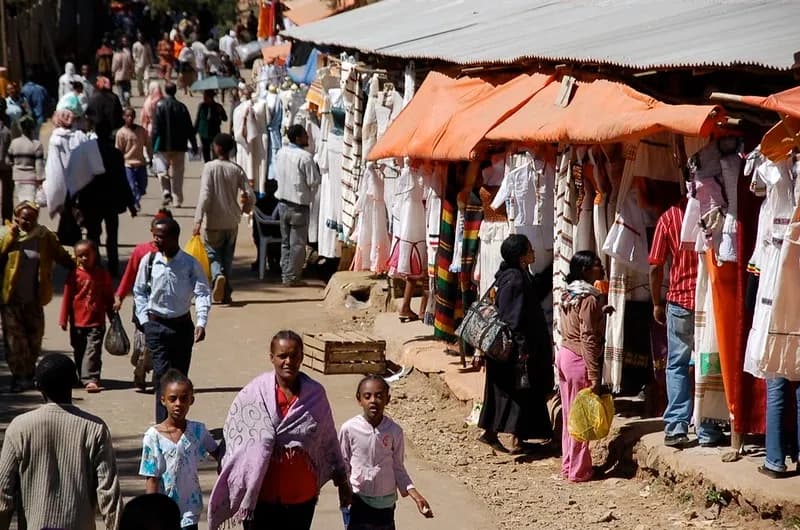Progress for 0 ad
Progress for 1 ad
Progress for 2 ad
Progress for 3 ad


Etenat Awol
Addis Ababa, Ethiopia

Addis Ababa trails far behind in digital adoption among Micro and Small Enterprises (MSEs), ranking lowest out of five global cities in a new study by the Center for Financial Inclusion at Accion. The results expose deep-rooted infrastructure gaps, digital illiteracy, and limited financial access that continue to stall the city's small business sector.
The report, titled “Small Firms, Big Impact: Digitization, Financial Services, and Climate Resilience in Five Emerging Markets,” surveyed more than 4,000 businesses across Addis Ababa, Delhi, Lagos, Jakarta, and São Paulo. Adaptive Cluster Sampling (ACS), a geospatial methodology designed to collect representative data from dispersed urban populations, was used in the study. Of those surveyed, over 800 businesses were based in Ethiopia’s capital.
The findings were striking. More than half of the businesses in Addis Ababa reported using no digital tools at all; a sharp contrast to São Paulo, where firms reported using an average of more than five digital applications, ranging from mobile payments and social media marketing to e-commerce platforms and business management software. On average, MSEs in Addis Ababa reported using just 1.6 digital tools out of 10 surveyed, the lowest among the five cities. São Paulo firms averaged 5.6 tools, while businesses in Delhi used 4.8, Jakarta 3.2, and Lagos 3.1.
While more than 50 percent of MSEs in Addis Ababa operate entirely offline, fewer than 15 percent of firms in São Paulo and less than 10 percent in Delhi do the same. In comparison, 30 percent of MSEs in Lagos and 20 percent in Jakarta reported operating without any digital tools.
The study assessed the adoption of various digital tools among MSEs, including digital payments (such as mobile money, POS systems, and digital wallets), messaging applications like WhatsApp and Telegram, social media platforms such as Facebook and Instagram, e-commerce platforms for online sales, business management apps for tasks like inventory and accounting, and other digital financial services like digital credit and microinsurance.
While 75% of Ethiopians live within mobile network coverage, only a fraction access mobile internet, largely due to affordability barriers, low smartphone ownership, and digital literacy gaps, according to GSMA data. This persistent “usage gap” exacerbates the challenges small businesses face and places Addis Ababa at the bottom of the digital adoption scale.
Accion’s study underscores that digital adoption is closely linked to business growth and resilience. MSEs that utilize digital tools are up to 10% more likely to report revenue growth. In digitally advanced cities like Delhi, businesses using digital services also demonstrate higher labor productivity and stronger financial health. Meanwhile, many of Addis Ababa’s small businesses, particularly in food retail and home-based services, remain excluded from these benefits.
Access to finance also remains a significant hurdle. While digital microcredit and insurance products have gained traction in cities like Jakarta and São Paulo, most MSEs in Addis Ababa still rely on informal safety nets like personal savings or family support. Uptake of formal financial services remains stubbornly low, with traditional institutions like Equb and Edir enduring as a preferred source for MSE owners.
Educational disparities further compound the challenges. While most entrepreneurs across the five cities had at least secondary education, Addis Ababa had a notably higher share of business owners with only primary education or no formal education at all. The city’s entrepreneurs also tend to be less experienced, averaging 2.8 years in business, compared to 10 years in São Paulo.
While the research by Accion highlights the high prevalence of non-usage of digital tools among MSMEs in Addis Ababa, a smaller study by Visa, published a few months back, suggests a mix of trends. Only one in five cash-only Small and Medium Enterprises (SMEs) planned to invest in digital payment technologies, even though businesses that already adopted digital payments reported a 92% satisfaction rate.
Still, Addis Ababa remains home to an estimated 153,000 micro and small businesses, with 43% owned by women, a much higher proportion than in Delhi (11%) and São Paulo (35%). A figure that contrasts with a national trend where gender disparities in business ownership are alarmingly prevalent across the rest of Ethiopia.
👏
😂
❤️
😲
😠

Etenat Awol
Etenat holds a degree in Journalism and her master's in Public Relations. Previously, she served as a university lecturer and has five years of experience in communications, media, digital marketing, and consulting.
Your Email Address Will Not Be Published. Required Fields Are Marked *